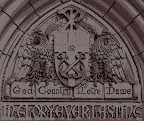John & Mary Catholic in the Spotlight
If you haven't already seen them, check out Amy Welborn's informative and highly amusing thread on Bishop Trautman's statement that the average Catholic will have trouble understanding the proposed translations of the Mass. For a succinct and witty response, do read George Weigel's article "We Are Not Morons"
Suppose for a minute that Catholics do come across unfamiliar words in the liturgy. Oddly enough, publishers seem to have anticipated such a dilemma by coming out with a book that - wait for it - provides the meaning of unfamiliar words. Even easier, if one were to Google, for example, "unsullied", and click on the first result, one would find the alternate meaning of "clean". The next time that word came up - in the liturgy or elsewhere - it would no longer be a mystery. More importantly, it would, I believe, lead to a higher level of engagement in said liturgy. Speaking at least for myself, I believe I would find myself more likely to pay attention if I had invested even a small amount of time into discovering the meaning of the prayers. Besides, having some level of mental engagement (hearing uncommon vocabulary) can only force listeners to pay closer attention, and I don't think anyone's arguing against that. A common tip in SAT prep for the Verbal section is to use context to determine or make an educated guess at the meaning of a word. Again, I think we would all be better off if we paid closer attention to what has sadly become all-too-familiar and zoned-out-upon words (I speak as much to myself here as to anyone).
Not only that, but the distinction between the language of the liturgy and the language of everyday conversation leads to a heightened sense of propriety. When one steps into a church, one is (hopefully) reminded visually that they are in a special place. The sights, smells, and music serve as a reminder that this is something set apart, and so too should the words spoken. When you receive a wedding invitation, it doesn't say "My parents and his parents want you to come to our wedding on June 7 - 1:30-ish. Let us know if you can make it." Rather, the words used denote the significance of the event taking place.
I mentioned SAT prep before. Most 11th & 12th grade students are required or strongly encouraged to take an SAT prep class. A bit part of that is studying vocabulary, including words like "abase", "abstruse", "onerous", and "obviate". If the average high-schooler can familiarize themselves with those words, which they'll rarely use, I think they can handle "sullied" and "unfeigned", which will - God willing - be used every Sunday in every Catholic church.
" Are there clunkers in the new translations? Undoubtedly. But will ICEL’s attempt to restore the sacral vocabulary and linguistic rhythms of the Roman Rite to Catholic worship within the Anglosphere destroy our ability to pray as a community? Please; we’re not morons. I’d even venture the guess that prayers translated with far more fidelity to the Latin originals will be a step toward a deeper, more prayerful encounter with what Bishop Trautman rightly calls “the greatest gift of God, the Eucharist.”
Suppose for a minute that Catholics do come across unfamiliar words in the liturgy. Oddly enough, publishers seem to have anticipated such a dilemma by coming out with a book that - wait for it - provides the meaning of unfamiliar words. Even easier, if one were to Google, for example, "unsullied", and click on the first result, one would find the alternate meaning of "clean". The next time that word came up - in the liturgy or elsewhere - it would no longer be a mystery. More importantly, it would, I believe, lead to a higher level of engagement in said liturgy. Speaking at least for myself, I believe I would find myself more likely to pay attention if I had invested even a small amount of time into discovering the meaning of the prayers. Besides, having some level of mental engagement (hearing uncommon vocabulary) can only force listeners to pay closer attention, and I don't think anyone's arguing against that. A common tip in SAT prep for the Verbal section is to use context to determine or make an educated guess at the meaning of a word. Again, I think we would all be better off if we paid closer attention to what has sadly become all-too-familiar and zoned-out-upon words (I speak as much to myself here as to anyone).
Not only that, but the distinction between the language of the liturgy and the language of everyday conversation leads to a heightened sense of propriety. When one steps into a church, one is (hopefully) reminded visually that they are in a special place. The sights, smells, and music serve as a reminder that this is something set apart, and so too should the words spoken. When you receive a wedding invitation, it doesn't say "My parents and his parents want you to come to our wedding on June 7 - 1:30-ish. Let us know if you can make it." Rather, the words used denote the significance of the event taking place.
I mentioned SAT prep before. Most 11th & 12th grade students are required or strongly encouraged to take an SAT prep class. A bit part of that is studying vocabulary, including words like "abase", "abstruse", "onerous", and "obviate". If the average high-schooler can familiarize themselves with those words, which they'll rarely use, I think they can handle "sullied" and "unfeigned", which will - God willing - be used every Sunday in every Catholic church.
















